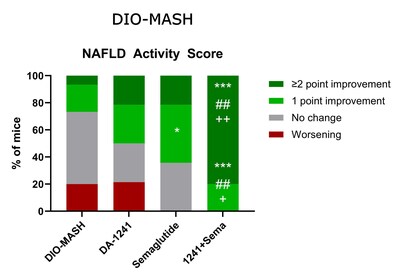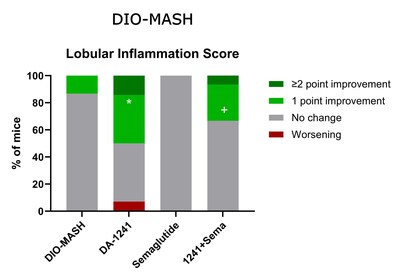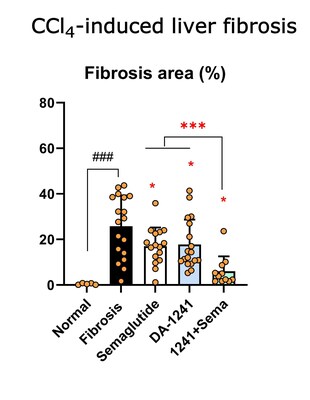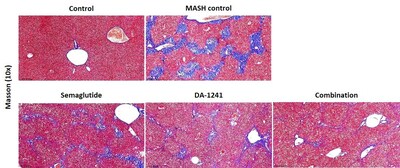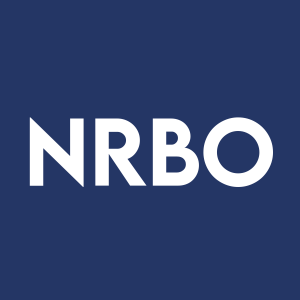NeuroBo Pharmaceuticals' DA-1241 in Combination with Semaglutide Improves Liver Fibrosis and Demonstrates Additive Hepatoprotective Effects in Pre-Clinical MASH Models Compared to Either Treatment, Alone
NeuroBo Pharmaceuticals announced that pre-clinical data suggests its novel GPR119 agonist, DA-1241, when combined with semaglutide (Wegovy®), enhances liver fibrosis improvement and exhibits additive hepatoprotective effects in MASH models compared to individual treatments. The data, to be presented at EASL Congress 2024, show significant benefits in reducing hepatic steatosis, inflammation, and fibrosis with this combination. The Phase 2a clinical trial of DA-1241 in MASH is ongoing, with top-line data expected by year-end. This development highlights the potential of DA-1241 as a therapeutic agent targeting liver inflammation and fibrosis in MASH.
- DA-1241 combined with semaglutide shows significant improvement in liver fibrosis and hepatoprotection over monotherapies.
- Data demonstrate over 80% improvement in liver fibrosis scores with combination therapy.
- Combination therapy led to a 25% body weight reduction in treated mice.
- Phase 2a clinical trial of DA-1241 in MASH ongoing with expected top-line data in Q4 2024.
- DA-1241's unique mechanism targets inflammation associated with MASH, indicating potential as a safe and effective treatment.
- No significant additional weight loss observed in combination therapy group compared to semaglutide alone.
- No significant influence on quantitative markers of fibrosis (PSR, Col1a1) observed.
- Ongoing clinical trials indicate that results are not yet conclusive; future outcomes remain uncertain.
- The company's financial stability may be affected by the high costs and risks associated with ongoing clinical trials.
Insights
The pre-clinical data on DA-1241, a GPR119 agonist, combined with semaglutide, illustrates promising therapeutic potential for treating liver fibrosis, a condition often linked to metabolic dysfunction-associated steatohepatitis (MASH). The data shows that the combination therapy produced additive hepatoprotective effects in MASH models, improving liver fibrosis and providing metabolic benefits which were superior to either treatment alone.
For retail investors, this indicates that NeuroBo Pharmaceuticals is advancing a novel and potentially effective treatment for MASH, a significant market given the increasing prevalence of liver metabolic disorders. The improvements in key histological and metabolic endpoints, such as reduced liver cholesterol levels and enhanced liver function biomarkers, may translate into meaningful clinical outcomes. However, it's important to remember that these results are pre-clinical and successful translation to human trials isn't guaranteed.
Also noteworthy is the ongoing Phase 2a clinical trial, which will further test the combination's efficacy. Positive outcomes from this trial could substantially bolster NeuroBo's position in the cardiometabolic disease treatment market. However, investors should watch for updates and be aware of the inherent risks of clinical development, including potential trial delays or negative outcomes.
From a financial perspective, the announcement should be considered cautiously optimistic. NeuroBo Pharmaceuticals appears to be on a path of innovation with its DA-1241 combined therapy, addressing a niche but growing market of metabolic liver diseases. This market has significant potential due to the rising incidence of conditions like MASH, driven by global obesity trends and sedentary lifestyles.
The ongoing Phase 2a clinical trial is a critical milestone. Positive results could lead to increased investor confidence and potentially drive the stock price higher. Conversely, any setbacks might negatively impact investor sentiment and stock performance.
Additionally, the collaboration with reputable research organizations like Dong-A ST and Gubra lends credibility to the research outcomes, possibly attracting more significant interest from institutional investors. Retail investors should stay updated on clinical trial progress and upcoming data presentations for a clearer picture of the company’s future trajectory.
Data Will be Presented in Two Posters at the EASL Congress 2024
"The data being presented at EASL further strengthen the pre-clinical evidence that DA-1241's activation of GPR119 has therapeutic potential for the reduction of hepatic steatosis, inflammation, fibrosis, and improved glucose control," stated Hyung Heon Kim, President and Chief Executive Officer of NeuroBo. "In April, we completed enrollment for Part 1 of our Phase 2a clinical trial of DA-1241 in MASH and continue to enroll patients in Part 2, exploring the efficacy of DA-1241 in combination with sitagliptin, a DPP-4 inhibitor, which we believe will show synergistic effects compared to DA-1241, alone. The new data being presented at the EASL Congress explored DA-1241 in combination with semaglutide, a GLP1R agonist. Importantly, the data suggests, for the first time, a beneficial combination effect of DA-1241 and semaglutide in the treatment of liver fibrosis, which may be attributed to augmented inhibition of fibrogenesis and inflammation in the liver. The data also demonstrates more than additive effects on metabolic, biochemical, and histological endpoints in GAN DIO-MASH mice, highlighting the therapeutic potential of dual targeting GPR119 and GLP1R function in MASH with liver fibrosis. We eagerly anticipate reporting top-line data from both parts of the ongoing Phase 2a clinical trial in MASH in the fourth quarter of this year. We continue to believe the unique mechanism of DA-1241, targeting the inflammation associated with MASH, will translate into a safe and effective treatment for this disease."
- Abstract Title: Additive Hepatoprotective Effects of DA-1241, a Novel GPR119 Agonist, in Combination with Semaglutide in the GAN Diet-Induced Obese and Biopsy-Confirmed Mouse Model of MASH
- Authors: Monika Lewinska, Malte H. Nielsen, Susanne Pors, Henrik B. Hansen, Il Hoon Jung, Hyung Heon Kim, Michael Feigh, Mi-Kyung Kim
- Presenter Name: Dr. Michael Feigh, Vice President Scientific Research, Gubra
- Abstract Number: 1950
- Abstract ID: THU-232
- Session: Poster - MASLD: Experimental and pathophysiology
- Session Date: Thursday, June 6, 2024
- Session Time: 8:30 am – 6:00 pm CET
Male C57BL/6JRj mice were fed the GAN diet for 36 weeks before treatment initiation. Only biopsy-confirmed GAN DIO-MASH mice (steatosis score =3, lobular inflammation score ≥2, fibrosis stage F2-F3) were stratified to treatment (n=14-15 per group). GAN DIO-MASH mice received once daily treatment with vehicle, DA-1241 (100 mg/kg, PO) or semaglutide (30 nmol/kg, SC) alone or in combination for 8 weeks. Within-subject comparisons (pre vs. post treatment) were performed for liver biopsy histopathological NAFLD Activity Score (NAS) and Fibrosis Stage. Terminal quantitative endpoints included plasma/liver biochemistry, liver histomorphometry and RNA sequencing. DA-1241 was weight-neutral and did not influence liver weight. In contrast, semaglutide robustly reduced body weight by approximately
DA-1241 and semaglutide monotherapy each improved NAS (≥2-point) in
- Abstract Title: DA-1241, a GPR119 Agonist, Combined with Semaglutide Synergistically Improved Liver Fibrosis in Mice with CCl4 Induced Liver Fibrosis
- Authors: Il Hoon Jung, Tae Hyoung Kim, Sujin Lee, Yuna Chae, Hyung Heon Kim, Mi-Kyung Kim
- Presenter Name: II Hoon Jung, Dong-A ST Research Center
- Abstract Number: 117
- Abstract ID: THU-531
- Session: Poster - Fibrosis / Stellate cell biology
- Session Date: Thursday, June 6, 2024
- Session Time: 8:30 am – 6:00 pm CET
Liver fibrosis mice were generated by feeding a western diet in adjunctive with CCl4 injections. After administering CCl4 twice weekly for 3 weeks, mice with elevated plasma ALT levels were allocated to receive DA-1241 (oral) or semaglutide (subcutaneous) alone and in combination for 4 weeks. At the end of treatment, semaglutide reduced body weight by approximately
Collagen fiber deposition was prominent in mice treated with vehicle compared to the normal control group. However, DA-1241 or semaglutide alone lowered collagen-positive area compared to the vehicle-treated group (
After the presentations, the posters will be accessible within the "Presentations" section of NeuroBo's website at: https://www.neurobopharma.com/events-presentations/presentations.
About DA-1241
DA-1241 is a novel G-Protein-Coupled Receptor 119 (GPR119) agonist with development optionality as a standalone and/or combination therapy for both MASH and type 2 diabetes (T2D). Agonism of GPR119 in the gut promotes the release of key gut peptides GLP-1, GIP, and PYY. These peptides play a further role in glucose metabolism, lipid metabolism and weight loss. DA-1241 has beneficial effects on glucose, lipid profile and liver inflammation, supported by potential efficacy demonstrated during in vivo preclinical studies. The therapeutic potential of DA-1241 has been demonstrated in multiple pre-clinical animal models of MASH and T2D where DA-1241 reduced hepatic steatosis, inflammation, fibrosis, and improved glucose control. Furthermore, in Phase 1a and 1b trials, DA-1241 was well tolerated in both healthy volunteers and those with T2DM.
About NeuroBo Pharmaceuticals
NeuroBo Pharmaceuticals, Inc. is a clinical-stage biotechnology company focused on transforming cardiometabolic diseases. The company is currently developing DA-1241 for the treatment of Metabolic Dysfunction-Associated Steatohepatitis (MASH) and is developing DA-1726 for the treatment of obesity. DA-1241 is a novel G-protein-coupled receptor 119 (GPR119) agonist that promotes the release of key gut peptides GLP-1, GIP, and PYY. In preclinical studies, DA-1241 demonstrated a positive effect on liver inflammation, lipid metabolism, weight loss, and glucose metabolism, reducing hepatic steatosis, hepatic inflammation, and liver fibrosis, while also improving glucose control. DA-1726 is a novel oxyntomodulin (OXM) analogue that functions as a glucagon-like peptide-1 receptor (GLP1R) and glucagon receptor (GCGR) dual agonist. OXM is a naturally-occurring gut hormone that activates GLP1R and GCGR, thereby decreasing food intake while increasing energy expenditure, thus potentially resulting in superior body weight loss compared to selective GLP1R agonists.
For more information, please visit www.neurobopharma.com.
Forward Looking Statements
Certain statements in this press release may be considered forward-looking statements within the meaning of the Private Securities Litigation Reform Act of 1995. Words such as "believes", "expects", "anticipates", "may", "will", "should", "seeks", "approximately", "intends", "projects", "plans", "estimates" or the negative of these words or other comparable terminology (as well as other words or expressions referencing future events, conditions or circumstances) are intended to identify forward-looking statements. Forward-looking statements are predictions, projections and other statements about future events that are based on current expectations and assumptions and, as a result, are subject to risks and uncertainties. Many factors could cause actual future events to differ materially from the forward-looking statements in this press release, including, without limitation, those risks associated with NeuroBo's ability to execute on its commercial strategy; the timeline for regulatory submissions; ability to obtain regulatory approval through the development steps of NeuroBo's current and future product candidates, the ability to realize the benefits of the license agreement with Dong-A ST Co. Ltd., including the impact on future financial and operating results of NeuroBo; the cooperation of our contract manufacturers, clinical study partners and others involved in the development of NeuroBo's current and future product candidates; potential negative interactions between our product candidates and any other products with which they are combined for treatment; NeuroBo's ability to initiate and complete clinical trials on a timely basis; our ability to recruit subjects for its clinical trials; whether NeuroBo receives results from NeuroBo's clinical trials that are consistent with the results of pre-clinical and previous clinical trials; impact of costs related to the license agreement, known and unknown, including costs of any litigation or regulatory actions relating to the license agreement; effects of changes in applicable laws or regulations; effects of changes to NeuroBo's stock price on the terms of the license agreement and any future fundraising; and other risks and uncertainties described in our filings with the Securities and Exchange Commission, including our most recent Annual Report on Form 10-K. Forward-looking statements speak only as of the date when made. NeuroBo does not assume any obligation to publicly update or revise any forward-looking statements, whether as a result of new information, future events or otherwise, except as required by law.
Contact:
NeuroBo Pharmaceuticals, Inc.
Marshall H. Woodworth
Chief Financial Officer
+1-857-299-1033
marshall.woodworth@neurobopharma.com
Rx Communications Group
Michael Miller
+1-917-633-6086
mmiller@rxir.com
![]() View original content to download multimedia:https://www.prnewswire.com/news-releases/neurobo-pharmaceuticals-da-1241-in-combination-with-semaglutide-improves-liver-fibrosis-and-demonstrates-additive-hepatoprotective-effects-in-pre-clinical-mash-models-compared-to-either-treatment-alone-302152170.html
View original content to download multimedia:https://www.prnewswire.com/news-releases/neurobo-pharmaceuticals-da-1241-in-combination-with-semaglutide-improves-liver-fibrosis-and-demonstrates-additive-hepatoprotective-effects-in-pre-clinical-mash-models-compared-to-either-treatment-alone-302152170.html
SOURCE NeuroBo Pharmaceuticals, Inc.







